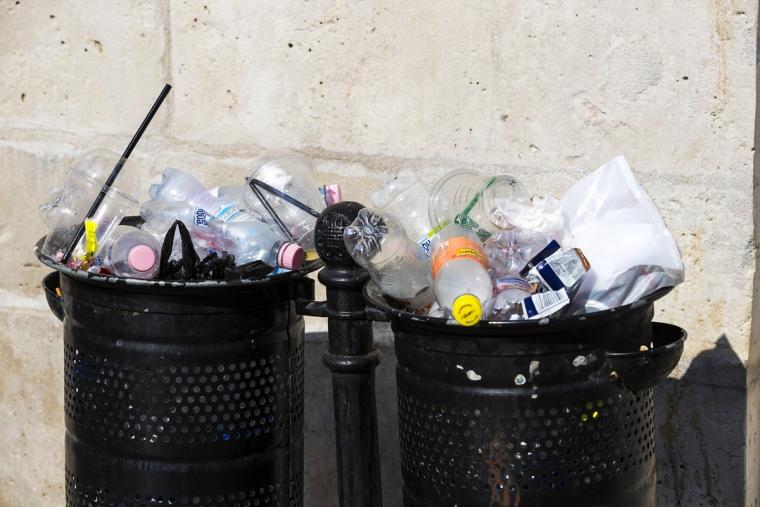
Late last year, during two Depeche Mode concerts, Crytpo.com Arena in Los Angeles launched a reusable cup pilot program in which the venue and its partner ABM Industries now sorts on-site single-use food service ware for recycling — diverting hundreds of thousands of single-use cups from the waste stream through reuse.
Crypto.com Arena (home of four NBA, NHL and WNBA franchises) teamed up with r.World, a leading reuse platform, to implement the program before the concerts, apparently in a nod to Depeche Mode.
“We were inspired by the artists’ passion for eco-conscious initiatives and felt this was a fantastic opportunity to implement this exciting inaugural pilot with AEG's established partner, r. World,” arena president Lee Zeidman said in a statement. “Our aim is to ignite a wave of positive change and rally our audience and partners to actively participate in shaping a more eco-conscious future. We thank members of Depeche Mode and their management team, as well as Live Nation, for helping to inspire the deployment of this reusable program.”
The veteran British band, of course, doesn’t deserve all the credit. Stadiums, arenas and sports leagues around the world have made sustainability moves in the name of increased environmental responsibility.
At the 2023 Women’s UEFA (Union of European Football Associations) Champions League (UCL) Women’s Final at PSV Stadium in Eindhoven, Netherlands, in early June and a week later at the UCL Final at Istanbul’s Atatürk Olympic Stadium, PepsiCo and UEFA implemented new practices designed to minimize soccer’s impact on the environment.
Centered on the “3Rs” — reduce, reuse and recycle — the effort is part of UEFA’s strategy to “having all UCL Finals be zero waste to landfill by 2026,” according to program officials.
“The huge global scale of sports simultaneously presents environmental challenges and exciting opportunities to engage with a huge fanbase to create positive change,” Archana Jagannathan, chief sustainability officer for PepsiCo Europe, told Packaging World. “We acknowledge that food and beverage is a large contributor to the environmental footprint created at football events, but the good news is that, according to a survey by Lifetackle, 90% of fans not only share our desire to reduce waste, they are also willing to be part of the solution by collecting and recycling litter after consumption.”
Back in the States, the NBA’s Portland Trailblazers hosted its first “Green Game” in December at Moda Center to highlight the various programs that are part of the franchise’s ongoing commitment to sustainability. Fans attending the game were offered opportunities to learn how they can positively impact the environment through their own behavior, win prizes and sample the future of sustainable packaging.
 Thanks to its “Rip City Reuse” program launched arena-wide last fall, Moda Center is the only venue in North American professional sports to utilize reusable cups for every event on every level of the venue, according to Trailblazers officials. Any alcoholic beverage purchased at Moda Center will be provided in a free Rip City Reuse cup. By partnering with Portland-based Bold Reuse, the team eliminated more than 80,000 single-use cups from ending up in landfills during the early months of the 2023-24 season.
Thanks to its “Rip City Reuse” program launched arena-wide last fall, Moda Center is the only venue in North American professional sports to utilize reusable cups for every event on every level of the venue, according to Trailblazers officials. Any alcoholic beverage purchased at Moda Center will be provided in a free Rip City Reuse cup. By partnering with Portland-based Bold Reuse, the team eliminated more than 80,000 single-use cups from ending up in landfills during the early months of the 2023-24 season.
“If every fan returns their cup this season, the organization can eliminate half a million single-use cups from going to landfill, making it one of our most fan-connected opportunities to spotlight and participate in sustainability,” according to the team’s website.
The Trail Blazers also recently partnered with Notpla, an award-winning UK-based packaging company on the first-ever pilot of Notpla’s products at a North American professional sports event. The products include regenerative packaging materials made from seaweed and plants that were available to fans on the arena’s club level. The products then could be composted and “disappear without a trace — just like a fruit peel,” according to the Trailblazers.
Meanwhile, the New York City Council recently “enacted legislation requiring operators of sports stadiums and arenas to allow attendees to bring refillable beverage containers into events in those venues,” according to the Natural Resources Defense Council. The bill still needs Mayor Eric Adams’ signature, but insiders expect him to sign it into a law that would take effect this spring.
“[I]t is expected to eliminate the consumption and disposal of hundreds of thousands of plastic water bottles at New York City stadiums and arenas, every year,” Eric A. Goldstein, senior attorney and director for the New York City Environment, People & Communities Program wrote on the NRDC’s Expert Blog. “Covered by the legislation are the city’s largest sports facilities, including Citi Field, Yankee Stadium, Arthur Ashe Stadium, Madison Square Garden and the Barclays Center, as well as smaller venues like Columbia University’s Lawrence A. Wien Stadium, St. John’s University’s Carnesecca Arena and Wagner College Stadium.
“Some stadium operators around the nation have prohibited fans from bringing refillable beverage containers into sporting events and concerts out of largely unfounded safety concerns — and perhaps to boost sales of water and other beverages sold on premises,” Goldstein continued. “Under this legislation, stadium and arena operators may require that containers not have a capacity greater than 24 fluid ounces and be empty when patrons arrive at the turnstiles.”
“This is one of those rare opportunities where a change in law in NYC will truly change eco-practices widely throughout the USA and at venues around the world,” Allen Hershkowitz, founding director and chair of Sport and Sustainability International and environmental science advisor to the New York Yankees, told Goldstein.

